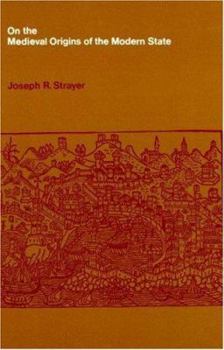On the Medieval Origins of the Modern State
Select Format
Select Condition 
Book Overview
The book description for the previously published "On the Medieval Origins of the Modern State" is not yet available.
Format:Paperback
Language:English
ISBN:0691007691
ISBN13:9780691007694
Release Date:January 1973
Publisher:Princeton University Press
Length:120 Pages
Weight:0.34 lbs.
Dimensions:0.3" x 5.0" x 8.0"
Customer Reviews
4 ratings
On the Medieval Origins of the Modern State
Published by Thriftbooks.com User , 18 years ago
Strayer's depth of knowledge and simplicity of thought are seldom combined in books with a challenging thesis that is still debated today. For example, the recent President of the American Historical Associate(James J. Sheehan) presented a Presidential Address(AHR Feb.2006) that challenges Strayer's analysis of the origins of sovereignty in Western Europe and more than a few recent historians have criticized Strayer's Anglophile framework for analyzing the evolving types of governing entities found in France and England in the 1300's. Not bad for a book that is a little over 100 pages long and written nearly 40 years ago. A suberb example of concise and erudite scholarship!
All State, No Nation
Published by Thriftbooks.com User , 19 years ago
This is a classic, both for it's clarity and for its brevity(110 pages!). Strayer was a professor at Princeton and worked for the CIA on the side. In his book, "the invention of the middle ages", Norman Cantor describes his life as a graduate student at Princeton under Strayer. Apparently he was always running off to advise the government on one thing or another. It's an amusing thought. Strayer's analysis is heavy on the bureaucratic development of france and england, light on everything else. Basically, he contrasts the centralist state of England with the "mosaic" state of France, and demonstrates how the heavy bureaucracy of france (and other contiental states of europe) can be attributed to the need of a weak central government to integrate provinces with their own "national" identities. This goal was accomplished by layering different sorts of councils and administrators on top of one another, with the King at the top. This is contrasted with England, which functioned, in Strayer's mind as a "large french province", with the King at the top of an abbreviated hierarchy. His institutional focus is on the development of law courts and the finance ministry- these were the first departments to come of age in the west. The law courts because the king's original power was as court of last resort, the finance ministry because... well, every prince needs money. As the title says, this is a book about the state, not the nation. There is no mention of culture in here, so don't look for it.
Strayer is a genius
Published by Thriftbooks.com User , 22 years ago
The true mark of a genius is in developing an idea that, when put forth seems obvious, yet is an original idea. This book is Strayer's work of genius. Being so short, Strayer's book should be mandatory reading in the public school system. No one else has come close to explaining the unique origin of the state system in the modern West.
excellent and clearly written scholarly treatise
Published by Thriftbooks.com User , 26 years ago
This book, as is well known, is a small classic among history books on Medieval Europe since its publication in the early 19seventies. There is a clear and distinct approach of rational government building in 11-14th century England and France, and how the modern state has roots shaped by the lessons and experiences of that time. Although the treatise is short, it is very clearly and concisely written. Obviously, the writer has deep knowledge of what he is talking about, and reading the book gives a stong impression that there is much more behind the analysis that he gives. The idea of more-or-less rational institutional building of government functions in middle-to late Medieval times does leave out a lot of other human elements shaping human governance at that time, while i got a distinct impression of the smoothness of the whole process overall. This seems certainly very debatable. Nevertheless, perhaps the sharp focus is what makes the book so very clear, informative and enjoyable to read. A definite must for any serious Medieval history buff...





